| Listing 1 - 5 of 5 |
Sort by
|
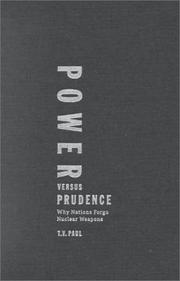
ISBN: 1282858831 9786612858833 0773568646 9780773568648 0773520864 9780773520868 0773520872 9780773520875 9781282858831 6612858834 Year: 2000 Publisher: Montreal, Que. McGill-Queen's University Press
Abstract | Keywords | Export | Availability | Bookmark
 Loading...
Loading...Choose an application
- Reference Manager
- EndNote
- RefWorks (Direct export to RefWorks)
In Power versus Prudence Paul develops a prudential-realist model, arguing that a nation's national nuclear choices depend on specific regional security contexts: the non-great power states most likely to forgo nuclear weapons are those in zones of low and moderate conflict, while nations likely to acquire such capability tend to be in zones of high conflict and engaged in protracted conflicts and enduring rivalries. He demonstrates that the choice to forbear acquiring nuclear weapons is also a function of the extent of security interdependence that states experience with other states, both allies and adversaries. He applies the comparative case study method to pairs of states with similar characteristics - Germany/Japan, Canada/Australia, Sweden/Switzerland, Argentina/Brazil - in addition to analysing the nuclear choices of South Africa, Ukraine, South Korea, India, Pakistan, and Israel. Paul concludes by questioning some of the prevailing supply side approaches to non-proliferation, offering an explication of the security variable by linking nuclear proliferation with protracted conflicts and enduring rivalries. Power versus Prudence will be of interest to students of international relations, policy-makers, policy analysts, and the informed public concerned with the questions of nuclear weapons, non-proliferation, and disarmament.
Nuclear weapons --- Nuclear nonproliferation. --- Security, International. --- Collective security --- International security --- International relations --- Disarmament --- International organization --- Peace --- Export of nuclear materials --- Export of nuclear technology --- International control of nuclear energy --- Nonproliferation, Nuclear --- Nuclear energy --- Nuclear exports --- Nuclear proliferation --- Proliferation, Nuclear --- Nuclear arms control --- Nuclear-weapon-free zones --- Atomic weapons --- Fusion weapons --- Thermonuclear weapons --- Weapons of mass destruction --- No first use (Nuclear strategy) --- Nuclear disarmament --- Nuclear warfare --- Government policy. --- International control
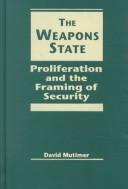
ISBN: 1555877877 9781555877873 1588269663 9781588269669 Year: 2000 Publisher: Boulder, Colo. Rienner
Abstract | Keywords | Export | Availability | Bookmark
 Loading...
Loading...Choose an application
- Reference Manager
- EndNote
- RefWorks (Direct export to RefWorks)
The proliferation of all kinds of weapons (nuclear, chemical, biological, and even conventional) is emerging as a focal point for international security. This book shows how both the language used to talk about weapons proliferation and the practices adopted to respond to it serve to define the problem in ways that promote policy responses doomed to failure. Examining the metaphors that have been gathered into the proliferation discourse—in terms of the nature of the problems they construct, the various interests they create, and the identity of the actors that are constituted—Mutimer makes a seminal contribution to both critical IR and policy debates.
Polemology --- Nuclear nonproliferation. --- Nuclear arms control. --- Biological arms control. --- Chemical arms control. --- Security, International. --- Non-prolifération nucléaire --- Armes nucléaires --- Armes biologiques --- Armes chimiques --- Sécurité internationale --- Contrôle --- Non-prolifération nucléaire --- Armes nucléaires --- Sécurité internationale --- Contrôle --- Collective security --- International security --- Chemical weapons control --- Biological weapons control --- Nuclear weapons control --- Export of nuclear materials --- Export of nuclear technology --- International control of nuclear energy --- Nonproliferation, Nuclear --- Nuclear energy --- Nuclear exports --- Nuclear proliferation --- Proliferation, Nuclear --- International control --- International relations --- Disarmament --- International organization --- Peace --- Arms control --- Nuclear weapons --- Nuclear arms control --- Nuclear-weapon-free zones
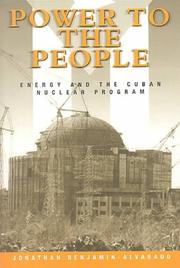
ISBN: 0415924383 0415924375 0203901304 1135960704 1280407115 0585451753 8121209277 9780203901304 9781135960650 9781135960698 9781135960704 9780415924375 9780415924382 1135960690 Year: 2000 Publisher: New York : Routledge,
Abstract | Keywords | Export | Availability | Bookmark
 Loading...
Loading...Choose an application
- Reference Manager
- EndNote
- RefWorks (Direct export to RefWorks)
Power to the People analyzes energy development in Cuba both before and after the Cold War and discusses the risks and opportunities associated with the development and expansion of the Cuban energy sector.
Nuclear energy - Government policy - Cuba. --- Nuclear industry - Political aspects - Cuba. --- Nuclear nonproliferation. --- Nuclear energy --- Nuclear industry --- Government policy --- Political aspects --- Export of nuclear materials --- Export of nuclear technology --- International control of nuclear energy --- Nonproliferation, Nuclear --- Nuclear exports --- Nuclear proliferation --- Proliferation, Nuclear --- Atomic energy industries --- Atomic industry --- Atomic power industry --- Nuclear energy industry --- Nuclear power industry --- Atomic energy --- Atomic power --- Energy, Atomic --- Energy, Nuclear --- Nuclear power --- Power, Atomic --- Power, Nuclear --- International control --- Nuclear arms control --- Nuclear-weapon-free zones --- Energy industries --- Force and energy --- Nuclear physics --- Power resources --- Nuclear engineering --- Nuclear facilities --- Nuclear power plants
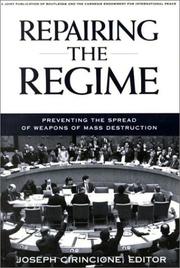
ISBN: 0415925967 Year: 2000 Publisher: London ; New York, NY : Routledge,
Abstract | Keywords | Export | Availability | Bookmark
 Loading...
Loading...Choose an application
- Reference Manager
- EndNote
- RefWorks (Direct export to RefWorks)
Armes biologiques [Limitation des ] --- Armes chimiques--Contrôle --- Armes de destruction de masse --- Armes nucléaires--Contrôle --- Armes nucléaires--Non-prolifération --- Biological arms control --- Biological weapons control --- Biologische wapens--Wapenbeheersing --- Chemical arms control --- Chemical weapons control --- Chemische wapens--Controle --- Controle op de kernwapens --- Contrôle des armes nucléaires --- Export of nuclear materials --- Export of nuclear technology --- Export van nucleair materiaal --- Export van nucleaire technologie --- Exportation de matériel nucléaire --- Exportation de technologie nucléaire --- Kernwapens--Controle --- Kernwapens--Non-proliferatie --- Limitation des armes biologiques --- Massavernietigingswapens --- Matériel nucléaire--Exportation --- Non-proliferatie [Nucleaire ] --- Non-proliferatie van kernwapens --- Non-prolifération d'armes nucléaires --- Non-prolifération nucléaire --- Nonproliferation [Nuclear ] --- Nucleair materiaal--Export --- Nucleaire grondstoffen--Export --- Nucleaire non-proliferatie --- Nuclear arms control --- Nuclear exports --- Nuclear nonproliferation --- Nuclear proliferation --- Nucleire technologie--Export --- Proliferatie [Nucleaire ] --- Proliferation [Nuclear ] --- Prolifération nucléaire --- Technologie nucléaire--Exportation --- Weapons of mass destruction
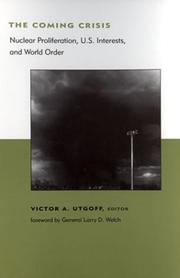
ISBN: 026228538X 142373081X 9780262285384 0262710056 9780262710053 9781423730811 Year: 2000 Publisher: Cambridge, Ma. : MIT Press,
Abstract | Keywords | Export | Availability | Bookmark
 Loading...
Loading...Choose an application
- Reference Manager
- EndNote
- RefWorks (Direct export to RefWorks)
Weapons of mass destruction. --- Nuclear nonproliferation. --- National security --- International relations. --- Weapons of mass destruction --- Nuclear nonproliferation --- International relations --- Military Science - General --- Military & Naval Science --- Law, Politics & Government --- Coexistence --- Foreign affairs --- Foreign policy --- Foreign relations --- Global governance --- Interdependence of nations --- International affairs --- Peaceful coexistence --- World order --- Sovereignty --- World politics --- National security policy --- NSP (National security policy) --- Security policy, National --- Economic policy --- Military policy --- Export of nuclear materials --- Export of nuclear technology --- International control of nuclear energy --- Nonproliferation, Nuclear --- Nuclear energy --- Nuclear exports --- Nuclear proliferation --- Proliferation, Nuclear --- Nuclear arms control --- Nuclear-weapon-free zones --- CBRNEs (Weapons) --- CBRNs (Weapons) --- Chemical, biological, radiological and nuclear weapons --- Mass destruction, Weapons of --- NBC agents (Weapons) --- NBC weapons --- Nuclear, biological and chemical weapons --- WMDs (Weapons) --- Military weapons --- Homeland defense --- Homeland security --- Government policy --- International control --- United States --- Military policy.
| Listing 1 - 5 of 5 |
Sort by
|

 Search
Search Feedback
Feedback About UniCat
About UniCat  Help
Help News
News